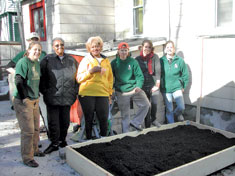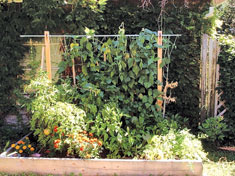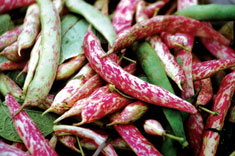
Farming the city, feeding the people
City residents face a growing problem often called the “food desert” due to the lack of access to healthy food choices. For example, many urban areas don’t have local grocery stores with fresh produce, forcing residents to buy processed food at so-called “convenience” stores. As a result, health epidemics like obesity end up plaguing low-income city residents because the foods that have the most starch and fat are also the cheapest. Local access to healthy food plays a large role in reducing these food-related health risks and can improve the eating behaviors of people in the community.
The Food Project is committed to increasing the amount of locally grown food available within the city of Boston. To that end, The Food Project offers the Build-a-Garden Program, aimed at establishing deeper connections between urban residents and the food they eat. This program intends to be part of the solution to building stronger communities in which every Boston neighborhood has access to fresh, local and affordable food. Build-a-Garden is designed to get more people growing their own food in Boston. This model’s goal is to foster self-reliance and ownership for urban residents, and provides greater access to healthy food that is often not affordable in supermarkets.
Participants in the program receive a raised bed with soil, seeds, transplants, a grower’s manual and gardening trainings. The program is committed to providing ongoing support so that all people, regardless of experience, will be able to become successful gardeners. In 2007, Food Project youth, staff and volunteers built 62 raised beds for Boston families and organizations. One gardener, Carolyn, remarked, “What a wonderful community builder this has been. Today a neighbor helped me harvest the green beans — over 10 feet tall on the netting — what a harvest …”
Several recipients of Build-a-Gardens were community organizations that involved youth in the process of growing food. As an Egleston Square Library staff member recently commented, “Our garden brought neighborhood kids together — outside learning about where their food comes from, in a fun and healthy environment. Grandparents came … and taught their grandchildren gardening techniques.” The impact that working in a garden can have on children is enormous — more willingness to try new vegetables, an increase in physical activity, a deeper appreciation and connection with the earth and an overall increase in the amount of vegetables they consume.
So, as the white and gray hues of winter surround Boston, The Food Project is inviting residents to dream of the possibilities for your garden. They are accepting applications for the Build-a-Garden Program until March 31, 2008. Space is limited so it is recommended that interested parties apply as early as possible. For applications or more information, contact Kathleen Banfield at 617-442-1322 x12, or by e-mail: kban field@thefoodproject.org., or visit the farmers’ market on Tuesdays and Thursdays from 3 - 7 p.m. at the intersection of Blue Hill Avenue and Dudley Street.
The Food Project piloted its Build-a-Garden Program in 2007 with support from the Boston Public Health Commission, the Herman and Frieda L. Miller Foundation, Patagonia Store, Social Capital Inc., and other partners. This year, the Project announced that the Environmental Protection Agency’s Healthy Communities Program, Herman and Frieda L. Miller Foundation and others will continue to support the program.
 

Clockwise from top: (1) Food Project staff, youth and Build-a-Gardeners pose after installing raised beds for two neighbors on the same street in Dorchester. (2) In this planted raised bed one successful Build-a-Gardener grows tomatoes, peppers, and even beans on her trellis. (3) Beans. Intensive planting in raised beds allows you to reap a large harvest.
|
